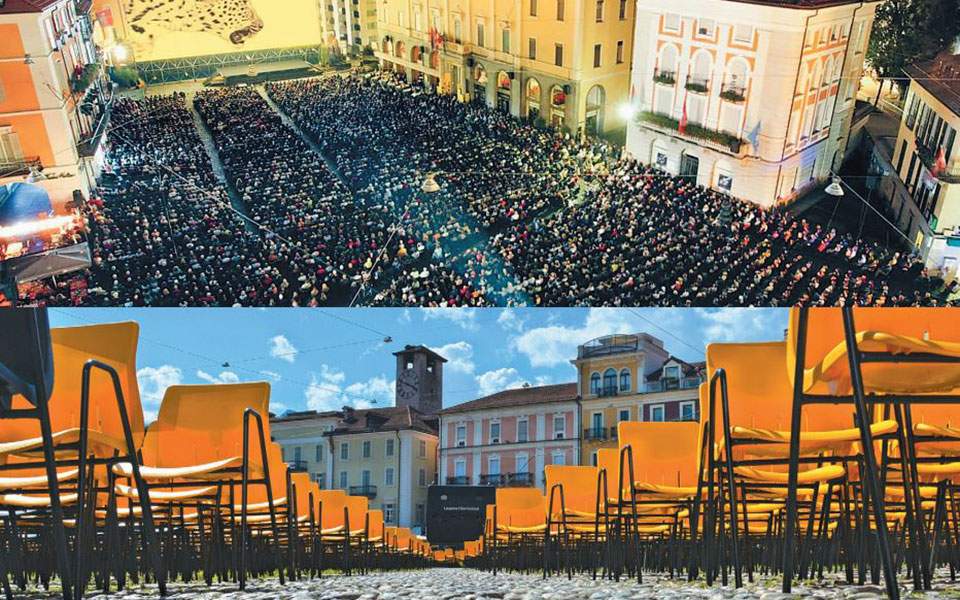For European cinema, unity brings strength

If anyone had suggested a close collaboration between the two highly competitive Cannes and Venice films festivals this time last year, they probably would have been laughed out of the room. Few things have managed to halt Cannes during its long history: There was World War II, which put the kibosh on the festival from 1940 to 1945, then money problems in 1948 and 1950, but since then it was only the political turmoil of 1968 that led to its annulment. In 2020, though, it was the coronavirus that led to the cancellation of what is arguably the biggest event on the movie awards calendar, as Covid-19 is impacting the film world just as significantly as every other aspect of life, closing down productions, cinemas and festivals.
Nevertheless, the efforts of festival organizers to keep the lines of communication between productions and their audiences open remain constant. Kathimerini reached out to officials at three influential European events to discuss the challenges of the pandemic and what the future holds.
“The virus has changed the world and our daily lives, and has obviously also impacted the film business and festivals. Among other things, this situation requires patience, and I guess this is something we are not used to. We want all the answers and we want them now,” said Carlo Chatrian, artistic director of the Berlin Film Festival.
“Many film festivals have taken a responsible attitude: They have decided to adjust their program or to use the funds for different activities, which depend also on their countries of origin. The need to express ourselves will always be there. I don’t see any problem in keeping this urge in place; what is in more danger now is the cinema as an industry, especially when it comes to small companies. Supporting the distribution of independent films will be something very important, I believe – maybe more important than supporting filmmaking itself. But I see I’m falling into the trap of making predictions – so I’ll stop here,” added Chatrian, who had the good fortune to see his festival go ahead before the coronavirus outbreak in Germany.
Lili Hinstin, head of the Locarno Festival that was due to start on August 5, couldn’t hide the disappoint in her voice over the telephone. “We faced the dilemma of canceling the festival or doing it online somehow. In my opinion, Locarno is not just a film festival, but an experience involving all the senses. It’s at the peak of the summer in a marvelous setting beside the Swiss lakes. People eat and drink and come together in the Piazza Grande to watch the major screenings on the huge 26-meter screen. These are things that cannot be replaced. I can’t imagine that a lot of people will feel like sitting down in front of their computer screen in the heat of the summer, after the lockdown, to watch the festival,” she said.
“In the end, we decided to support the artists as much as we can. We chose a series of films that were in various stages of production during the crisis and asked their creators to share something from them: the screenplays, a few scenes, whatever they want. A committee of filmmakers will award a special Golden Leopard and a cash prize of 70,000 Swiss francs to some of them. It’s purely a solidarity move,” added Hinstin.
The organizers of Cannes faced a similar dilemma, though presumably under significantly more pressure given the size of the event.
“For the time being, what we can do is tell filmmakers, ‘We’re here and we’re by your side.’ We have been forced to cancel our 2020 edition, but we continue watching films, giving feedback and possibly helping in elaborating a new strategy for the films,” said Paolo Moretti, head of Directors’ Fortnight at Cannes. “There is no ‘one solution fits all,’ as all the films are in a different situation: Some will be released in 2020, in theaters or online, and others will probably postpone their festival premiere and release. In both cases we are open to doing everything we can in order to support them.”
As for Venice, it is planning to go ahead on September 2, though this will also depend on international guests and audiences wanting to make the trip to Italy. If all works out well, the Cannes festival is also planning to play a role, according to its director, Thierry Fremont, who recently said it may screen a selection of its entries in Venice. All the major festivals, in fact, are seeking ways to cooperate amid the crisis, starting with “We Are One: A Global Film Festival,” an online event that is being broadcast on YouTube through June 7.
This spirit of solidarity may also prove a lifesaver for smaller events, like Greece’s Thessaloniki International Festival, whose 22nd spring documentary edition just wrapped up. The event was among the first in Europe to go online, showing a selection of its entries from different parts of the world. Having sold more than 72,000 tickets by the eighth of 10 days for 113 screenings with 400 viewers each, it appears that it was a success too.
However, while online may be the way to go for some and for now, the digital transformation is controversial.
“The virus is asking us to change our habits. There is some good in it – like taking the time to think carefully about what is essential in life and in art – and there are some downsides, which we are all experiencing. ‘Social distance’ is a very bad phrase to me. Cinema – the way I know it – is the opposite of social distance. Films connect people. When a film touches you deeply, you want to share it with others. You want to talk about it with them and hug them – not only in a metaphorical way. That’s what festivals are about: connecting people with stories that are made by other people. I don’t want to think that in the future the only chance to watch films will be in a private room: It will be very sad – not for cinema, but for us, as human beings,” said Berlin’s Chatrian.





